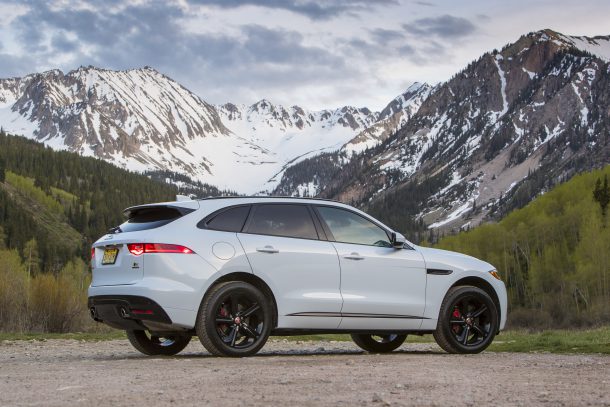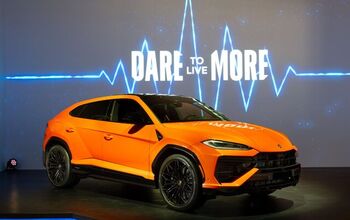Stop Being So Mean to Diesels, Pleads Jaguar Land Rover Boss

Ralf Speth isn’t having it. Across Europe governments are cracking down on the use of diesel vehicles in a bid to lower air pollution, especially in the Jaguar Land Rover CEO’s own country. London has announced plans to levy stiff charges on anyone driving a diesel-powered vehicle through central areas of the capital starting in early 2019, adding fuel to the anti-diesel fire. Paris, Berlin and Athens also plan to ban the technology.
With compression ignition still a significant part of the automaker’s engine lineup — both in Europe and North America — Speth recently defended the technology’s importance in a finger-pointing spiel. The world needs diesel, he claimed, and the media (and Volkswagen) haven’t done anything to help the situation.
Speaking to UK’s Autocar, Speth claimed the need for improvements in diesel technology are crucial for his company and the broader industry. Jaguar Land Rover plans to ramp up messaging about the benefits of modern diesels.
“The latest diesel technology is really such a step in emissions, performance, particulates; it’s better for the environment when compared to [an equivalent] petrol,” Speth said. “Diesel has to – needs to – have a future.”
As diesels form the backbone of commercial and transit fleets the world over, more work is needed to keep it viable in the face of ever-stricter emissions regulations, the CEO remarked. However, the challenge doesn’t come solely from lawmakers — public perception has taken a huge hit. Speth implied the media has played a role in certain misconceptions by combining images of chugging oil burners of yesteryear with cleaner modern vehicles.
“Anyone can see the black smoke coming out of old diesels is bad. We need to replace them with newer ones,” he said.
There’s some truth to Speth’s remarks, as anyone near the media industry knows a sooty tailpipe from a 1980s-vintage diesel makes for a great image to lead off a segment. Many will remember the college professor with the fearsomely slow inline-six Volvo 240 diesel or, if they grew up in America, the rattling Oldsmobiles diesels of 35 years ago.
Media aside, Speth blames Volkswagen’s emissions cheating for kicking off the current war against the technology.
“Nobody believes the automotive industry anymore,” he said. “They see us as offenders and not giving the right information. We have to show our technology is the best you can buy, to reduce the damage to health and the environment.”
Speth claims banning diesels from cities and attempting to usher them out of the marketplace will end up shooting environmentalists and regulators in the foot. While the future of the industry lies in electrification, the diesel backlash is harming emissions targets by spurring a return to gasoline engines, he said.
In addition to more lenient rules against gasoline cars, the London plan will see diesel vehicles that don’t meet new Euro 6 emissions standards fined £12.50 ($16.23 USD) to drive through central London. Buses and commercial trucks would pay about $130 per trip. Put another way, that’s a $16 one-way fine for the technology in a five-year-old car.
Continued advancement of Jaguar diesel technology would certainly garner applause from auto journos, many of whom haven’t taken too kindly to the diesel F-Pace and XE.
[Image: Jaguar Land Rover]

More by Steph Willems
Latest Car Reviews
Read moreLatest Product Reviews
Read moreRecent Comments
- Namesakeone If I were the parent of a teenage daughter, I would want her in an H1 Hummer. It would be big enough to protect her in a crash, too big for her to afford the fuel (and thus keep her home), big enough to intimidate her in a parallel-parking situation (and thus keep her home), and the transmission tunnel would prevent backseat sex.If I were the parent of a teenage son, I would want him to have, for his first wheeled transportation...a ride-on lawnmower. For obvious reasons.
- ToolGuy If I were a teen under the tutelage of one of the B&B, I think it would make perfect sense to jump straight into one of those "forever cars"... see then I could drive it forever and not have to worry about ever replacing it. This plan seems flawless, doesn't it?
- Rover Sig A short cab pickup truck, F150 or C/K-1500 or Ram, preferably a 6 cyl. These have no room for more than one or two passengers (USAA stats show biggest factor in teenage accidents is a vehicle full of kids) and no back seat (common sense tells you what back seats are used for). In a full-size pickup truck, the inevitable teenage accident is more survivable. Second choice would be an old full-size car, but these have all but disappeared from the used car lots. The "cute small car" is a death trap.
- W Conrad Sure every technology has some environmental impact, but those stuck in fossil fuel land are just not seeing the future of EV's makes sense. Rather than making EV's even better, these automakers are sticking with what they know. It will mean their end.
- Add Lightness A simple to fix, strong, 3 pedal car that has been tenderized on every corner.


































Comments
Join the conversation
When I hired a car in Ireland several years ago the Diesel cars were the premium rentals. I got a Ford Mondeo for 10 days and fell in love with it. The Mondeo finally showed up here in Canada as the Ford Fusion but I don't know if it could be had with a manual like my Irish hire car. Unfortunately the hood was bolted down on the Mondeo but I think it was a 2.0L 4-holer. What a great car that was.
No matter how you slice it, diesels have little or nothing to do with the future of automobiles. What part of "oil burner" don't you understand?? Until someone or technology fixes that part and the filthy junk that leaves the exhaust valves, it's just not happening. But then they wouldn't be "diesels" anymore.